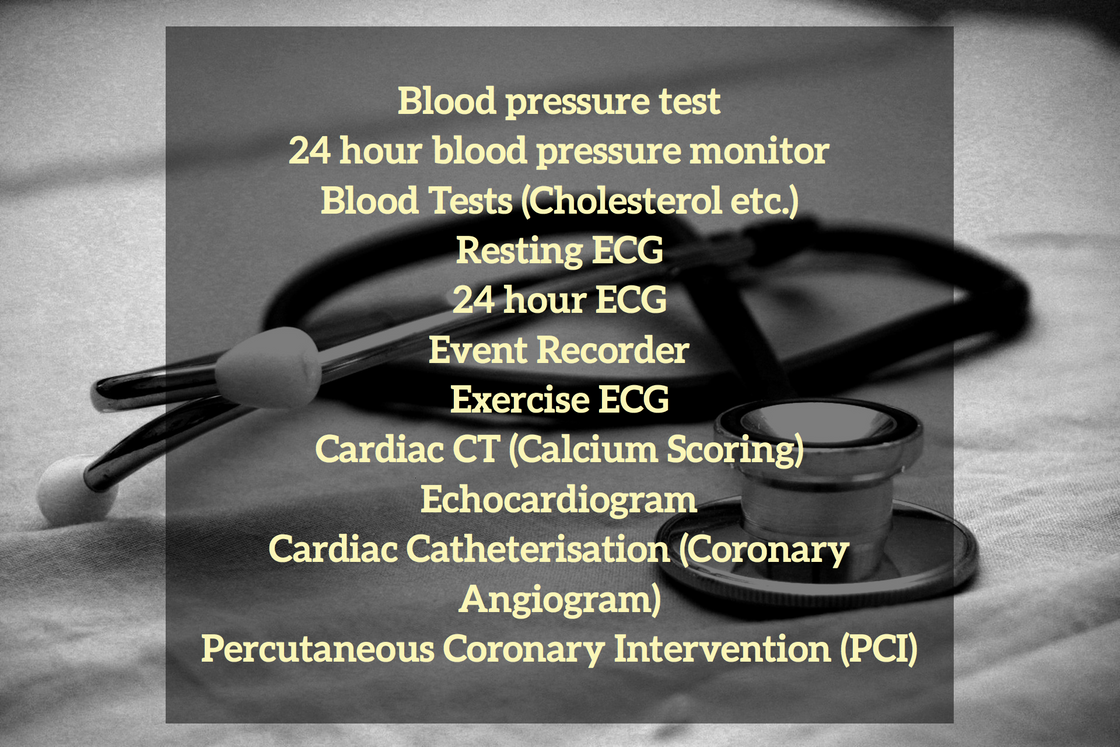Heart Test
The following Heart tests and treatments can be arranged without delay at a time which suits you best.

24 Hour Blood Pressure Monitor
24 Hour Blood Pressure Monitor allows to accurately make the diagnosis of Hypertension (High Blood Pressure).
It would also help to optimise your medical therapy.
Patients often do not know that they suffer from high blood pressure
and might not experience any symptoms.
Good blood pressure control is very important because
it reduces your risk of suffering from complications e.g.
Exercise ECG
Exercise treadmill ECG will assess how your heart responds to stress. When your heart rate increases during exercise your heart muscle needs more oxygen to cope with the stress. This is similar to when you drive faster in your car you will need more petrol. If patients suffer from flare up of the heart arteries then sometimes not enough oxygen can be delivered to the heart muscle under stress causing chest discomforts (Angina).
Percutaneous Coronary
Intervention
Percutaneous coronary intervention (PCI) can
help stretch the arteries of the heart and increases the blood
flow which helps reduce
symptoms (Angina). PCI can also help to
unblock chronically occluded arteries of your heart. Patients who suffer from an acute heart attack (blocked heart artery) are now widely treated in the UK (including Kent) with emergency balloon and stent treatment (primary PCI) in an attempt to unblock the heart artery as soon as possible.
24 Hour ECG
24 Hour ECG Monitor allows recording your heart rhythm for 24 hours.
This investigation is helpful if you suffer from daily palpitations or dizzy spells.
Echocardiogram
Echocardiogram is an ultrasound examination of your heart which allows us to visualise your heart and assess its pump function and heart valves in great detail.
Resting ECG
Event-recorder is a helpful investigation if you suffer from infrequent palpitations or dizzy spells. You are able to press a button and record your own heart rhythm at any stage for a couple of days/ weeks should you experience any symptoms
e.g.: palpitations or dizzy spells.
Cardiac Catheterisation
Coronary Angiography allows us to visualise the arteries of your heart. This investigation gives us the “plumbing” of your heart and helps to identify any narrowings (causing angina)
or blockages.
Identifying risk for heart disease
You can book a Heart Check Up with Dr Fountzopoulos if you have RISK FACTORS, prior to planned surgery or if you are simply worried about your heart health.
HEART TREATMENT
- Primary preventive Medical Therapy (To prevent developing heart problems in the future)
- Secondary preventive Medical Therapy (Optimal therapy in patients with heart problems)
- Percutaneous Coronary Intervention (Balloon and stent treatment)
- Heart Surgery
Some patients might not experience any symptoms, but might suffer from an increased risk of developing a heart problem in the future. The earlier a heart condition can be detected, Treatments can be started to protect patients in order to avoid serious consequences in future. We would therefore recommend particularly in those patients who have significant risk factors to undergo a Heart Check up.
One of the most commonest causes of Death worldwide and in the UK is due to heart problems. Some patients might experience symptoms such as:
Chest pain or ache (Angina)
Shortness of Breath
Heart Failure
Heart Murmur/ Heart Valve problems
High Blood Pressure (Hypertension)
Palpitations (Fast Heart Rate, Skipped or Extra Heart Beat)
Dizziness
Blackouts


